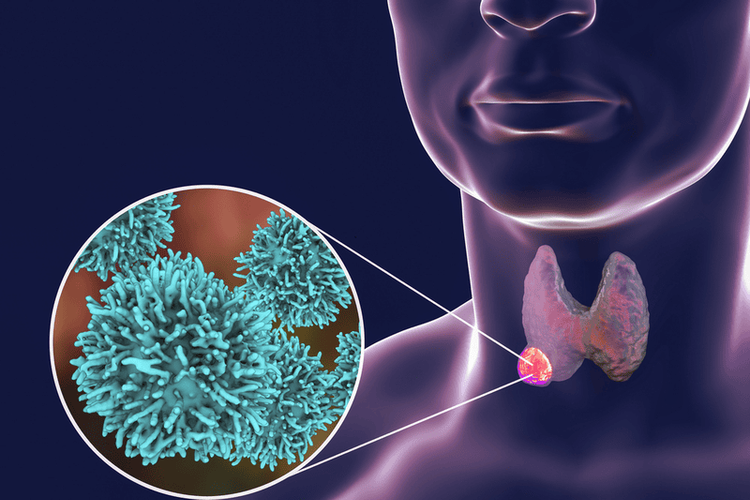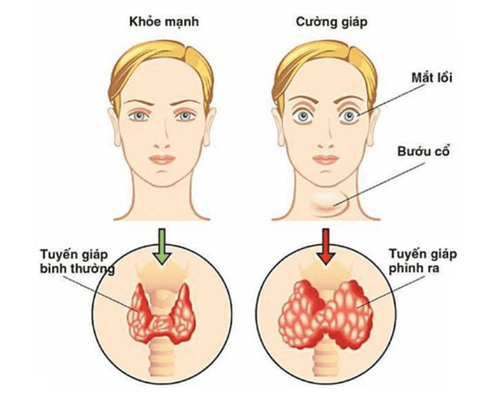This is an automatically translated article.
Basedow's disease is one of the most common thyroid problems. This disease usually affects mainly women, especially those who are in menopause (over 40 years old). With Graves' disease, people will have signs and symptoms, including fatigue, heart palpitations, excessive sweating, menstrual cycle changes, or a goiter.1. What is Basedow's disease?
Graves' disease, also known as Graves' disease, is one of the most common thyroid-related problems. This is an autoimmune disorder in which the body's immune system produces globulin antibodies that attach to healthy thyroid cells and stimulate them to produce more thyroid hormone. When this hormone is in excess, it leads to hyperthyroidism. Basedow's disease is one of the most common forms of hyperthyroidism.If not treated promptly, Graves' disease can cause some serious effects on many functions in the body, including the nervous system, brain, body temperature, and some muscles. other officials.

Bệnh Basedow có thể xảy ra cả ở nam giới và nữ giới
2. Symptoms of Basedow's disease
When having Graves' disease, the patient often shows the following symptoms:
Weight loss, despite no change in diet Increased sweating Tachycardia, high blood pressure accompanied by nervousness Trembling hands, weak muscles Increased sensitivity to temperature Diarrhea or increased frequency of bowel movements Goiter due to enlarged thyroid gland Changes in menstrual cycle Erectile dysfunction, decreased sex drive Heart failure Protruding eyes Dark skin and roughness Frequent irritability, anxiety Difficulty sleeping Graves' dermatosis, a condition in which red and thick skin appears on the legs (rare) In case if you are agitated, fever, delirious and rapid pulse There is a high chance that you are suffering from a "thyroid storm" or thyrotoxic crisis. If not treated in time, it can be life-threatening. Therefore, when you have any unusual symptoms, you should immediately go to medical facilities for examination and early treatment before the disease causes serious complications.

Suy tim là triệu chứng của bệnh Basedow
3. Causes of Graves' disease
The hormones secreted by the thyroid gland, or the rate at which the body converts food into energy. Metabolism is directly related to the amount of hormones circulating in the blood. For some reason, the thyroid gland secretes too much of these hormones, causing the body's metabolism to increase, causing symptoms of hyperthyroidism such as heart palpitations, sweating, trembling. and lose weight.
Normally, the thyroid works through a chemical, called thyroid-stimulating hormone (TSH), which is released by the pituitary gland in the brain. However, for someone with Graves' disease, the body's immune system malfunctions and releases abnormal antibodies that closely resemble TSH. These "false" signals confuse the immune system, further stimulating the overactive thyroid to produce hormones.
Currently, the exact reason why the immune system produces these abnormal antibodies has not been found. The researchers have suggested that heredity and a number of other characteristics may be important factors leading to this problem. For example, in a set of twins, if one has Graves' disease, there is a 20% chance that the other will also have it.
In addition to genetic factors, Basedow's disease can be caused by environmental influences. In particular, people who regularly smoke cigarettes have a higher risk of disease than other people.

Tiết quá nhiều hormon TSH là nguyên nhân gây bệnh Basedow
4. Why is Graves' disease common in women?
Women are one of the groups at high risk of Graves' disease. However, why is this disease more common in women than men? The main reason probably stems from the difference in physiological functions as well as anatomical aspects between men and women.
Most women go through more hormonal changes than men, such as puberty, the menstrual cycle, pregnancy, childbirth, lactation, and menopause.
Besides, a number of other factors, including:
Use of drugs: including sedatives, birth control pills, antibiotics or hormone therapies. Impaired Immune System: When the function of the immune system is impaired, it will have negative effects on the hormones inside the body and lead to a high risk of Graves' disease. Mental problems: Insomnia, extreme stress and anxiety are also major contributors to hormonal changes. History: Women who have had thyroid problems or have a family member with similar problems are more likely to develop Graves' disease than others. Diet: iodine deficiency or excess.

Thuốc tránh thai khiến bệnh Basedow lại phổ biến ở nữ giới
5. Treatment of Basedow's disease
Currently, the three most commonly used treatment options for Graves' patients include:
Thyroid medications: eg, prescription methimazole or propylthiouracil. In addition, beta-blockers may also be used to relieve symptoms caused by the disease. Radioactive iodine (RAI) therapy: this is one of the most common treatments for Basedow's disease. The patient will receive a dose of radioactive iodine 131 in pill form. Thyroid surgery: This treatment option is rarely used in cases of Graves' disease. Doctors only recommend surgery if previous treatments have not worked, or women who are pregnant cannot take thyroid medication. During surgery, the entire thyroid gland is removed to prevent the recurrence of hyperthyroidism. Vinmec International General Hospital is one of the hospitals that not only ensures professional quality with a team of leading doctors, modern equipment and technology, but also stands out for its examination and consulting services. and comprehensive, professional medical treatment; civilized, polite, safe and sterile medical examination and treatment space. Customers when choosing to perform tests here can be completely assured of the accuracy of test results.
If you have a need for consultation and examination at the Hospitals of the National Health System, please book an appointment on the website for service.
Articles refer to sources: webmd.com, medicalnewstoday.com, healthline.com
Please dial HOTLINE for more information or register for an appointment HERE. Download MyVinmec app to make appointments faster and to manage your bookings easily.













